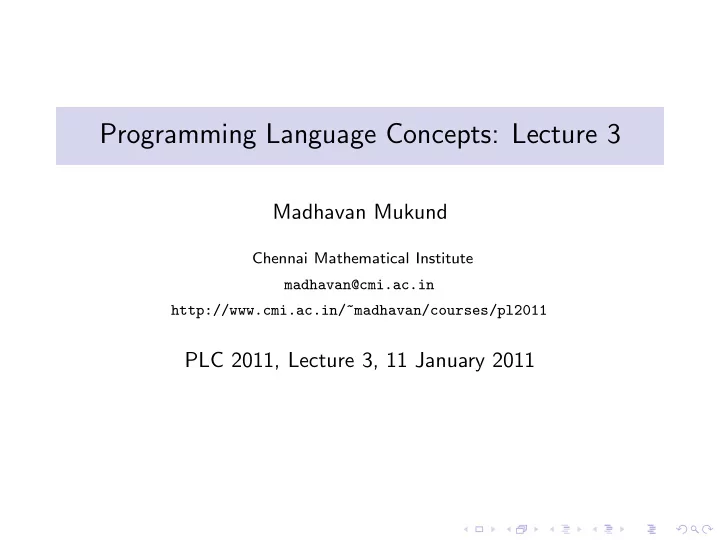

Programming Language Concepts: Lecture 3 Madhavan Mukund Chennai Mathematical Institute madhavan@cmi.ac.in http://www.cmi.ac.in/~madhavan/courses/pl2011 PLC 2011, Lecture 3, 11 January 2011
Object-oriented programming Abstract datatypes ◮ Combine data reprsentation with functions to manipulate data ◮ Clear way of demarcating the public interface of a datatype ◮ Encapsulation
Object-oriented programming Abstract datatypes ◮ Combine data reprsentation with functions to manipulate data ◮ Clear way of demarcating the public interface of a datatype ◮ Encapsulation Code reuse ◮ Extend and modify existing data types without duplicating code ◮ Inherit and update functionality ◮ Group datatypes in families — allow polymorphism
Subclasses ◮ A class Employee for employee data class Employee{ private String name; private double salary; // Some Constructors ... // "mutator" methods public boolean setName(String s){ ... } public boolean setSalary(double x){ ... } // "accessor" methods public String getName(){ ... } public double getSalary(){ ... } // other methods double bonus(float percent){ return (percent/100.0)*salary; }
Subclasses ◮ Managers are special types of employees with extra features class Manager extends Employee{ private String secretary; public boolean setSecretary(name s){ ... } public String getSecretary(){ ... } } ◮ Manager objects inherit other fields and methods from Employee ◮ Every Manager has a name , salary and methods to access and manipulate these. ◮ Manager is a subclass of Employee ◮ Think of subset
Subclasses ◮ Manager objects do not automatically have access to private data of parent class. ◮ Common to extend a parent class written by someone else
Subclasses ◮ Can use parent class’s constructor using super class Employee{ ... public Employee(String n, double s){ name = n; salary = s; } public Employee(String n){ this(n,500.00); } } ◮ In Manager public Manager(String n, double s, String sn){ super(n,s); /* super calls Employee constructor */ secretary = sn; }
Subclasses ◮ Subclass can override methods of super class double bonus(float percent){ return 1.5*super.bonus(percent); } ◮ In general, subclass has more features than parent class ◮ Can use a subclass in place of a superclass Employee e = new Manager(...) ◮ Every Manager is an Employee , but not vice versa! ◮ Recall ◮ int[] a = new int[100]; ◮ Aside: Why the seemingly redundant reference to int in new ? ◮ One can now presumably write Employee[] e = new Manager(...)[100]
Subclasses Employee e = new Manager(...) ◮ Can we invoke e.setSecretary ? ◮ e is declared to be an Employee ◮ Static typechecking — e can only refer to methods in Employee ◮ What about e.bonus(p) ? Which bonus do we use? ◮ Static: Use Employee.bonus ◮ Dynamic: Use Manager.bonus ◮ Dynamic dispatch (dynamic binding, late method binding, . . . ) turns out to be more useful ◮ Default in Java, optional in C++ (use virtual )
Dynamic dispatch Employee[] emparray = new Employee[2]; Employee e = new Employee(...); Manager m = new Manager(...); emparray[0] = e; emparray[1] = m; for (i = 0; i < emparray.length; i++){ System.out.println(emparray[i].bonus(5.0); } ◮ Every Employee in emparray “knows” how to calculate its bonus correctly! ◮ Also referred to as runtime polymorphism or inheritance polymorphism
Functions, signatures and overloading ◮ Signature of a function is its name and the list of argument types ◮ Can have different functions with the same name and different signatures ◮ For example, multiple constructors
Functions, signatures and overloading . . . ◮ Java class Arrays : method sort to sort arbitrary scalar arrays double[] darr = new double[100]; int[] iarr = new int[500]; ... Arrays.sort(darr); // sorts contents of darr Arrays.sort(iarr); // sorts contents of iarr ◮ Methods defined in class Arrays class Arrays{ ... public static void sort(double[] a){..} // sorts arrays of double[] public static void sort(int[] a){..} // sorts arrays of int[] ... }
Functions, signatures and overloading . . . ◮ Overloading: multiple methods, different signatures, choice is static ◮ Overriding: multiple methods, same signature, choice is static ◮ Employee.bonus ◮ Manager.bonus ◮ Dynamic dispatch: multiple methods, same signature, choice made at run-time
Inheritance Employee e = new Manager(...) ◮ Can we force e.setSecretary to work? ◮ Type casting ((Manager) e).setSecretary(s) ◮ Cast fails (error) if e is not a Manager ◮ Can test if e is a Manager if (e instanceof Manager){ ((Manager) e).setSecretary(s); } ◮ Reflection — “think about oneself”
Multiple inheritance C1 C2 C3 extends C1,C2
Multiple inheritance C1 C2 public int f() public int f() C3 extends C1,C2
Multiple inheritance C1 C2 public int f() public int f() C3 extends C1,C2 ◮ Which f do we use in C3 (assuming f is not redefined)? ◮ Java does not allow multiple inheritance ◮ C++ allows this if C1 and C2 have no conflict
Java class hierarchy ◮ No multiple inheritance — tree-like ◮ In fact, there is a universal superclass Object ◮ Useful methods defined in Object boolean equals(Object o) // defaults to pointer equality String toString() // converts the values of the // instance variable to String ◮ To print o , use System.out.println(o+"");
Java class hierarchy public int find (Object[] objarr, Object o){ int i; for (i = 0; i < objarr.length(); i++){ if (objarr[i] == o) {return i}; } return (-1); } ◮ Recall that == is pointer equality ◮ Redefine equals boolean equals(Date d){ return ((this.day == d.day) && (this.month == d.month) && (this.year == d.year)); }
Java class hierarchy ◮ boolean equals(Date d) does not override boolean equals(Object o) ! ◮ Should write boolean equals(Object d){ if (d instanceof Date){ return ((this.day == d.day) && (this.month == d.month) && (this.year == d.year)); } return(false); }
Java class hierarchy ◮ Overriding looks for “closest” match Suppose boolean equals(Employee e) but no equals in Manager Manager m1 = new Manager(...); Manager m2 = new Manager(...); ... if (m1.equals(m2)){ ... } boolean equals(Manager m) compatible with both boolean equals(Employee e) and boolean equals(Object o) Use boolean equals(Employee e)
Recommend
More recommend